Nursing Scope of Practice in Australia: A Comprehensive Analysis
VerifiedAdded on 2022/10/17
|8
|1873
|11
Essay
AI Summary
This essay delves into the scope of practice for registered nurses within the Australian healthcare system, emphasizing the importance of adapting to advancements in technology and medicine to effectively serve patients. It defines scope of practice, outlining the activities and responsibilities nurses are authorized to perform, adhering to the Nursing and Midwifery Board of Australia (NMBA) guidelines. The essay explores the core values nurses must uphold, including prioritizing patient needs, ensuring respectful and non-discriminatory care, and fostering trusting relationships. It also highlights the influence of various factors, such as professional practice and international guidelines, on nursing practice. Furthermore, the essay describes the author's aspiration to become a medical-surgical nurse, supported by a reflection on a clinical placement experience in a surgical ward. The Gibbs reflective cycle is used to analyze an instance of administering medication, highlighting the emotional and professional challenges faced, and identifying areas for improvement to enhance confidence and patient care.
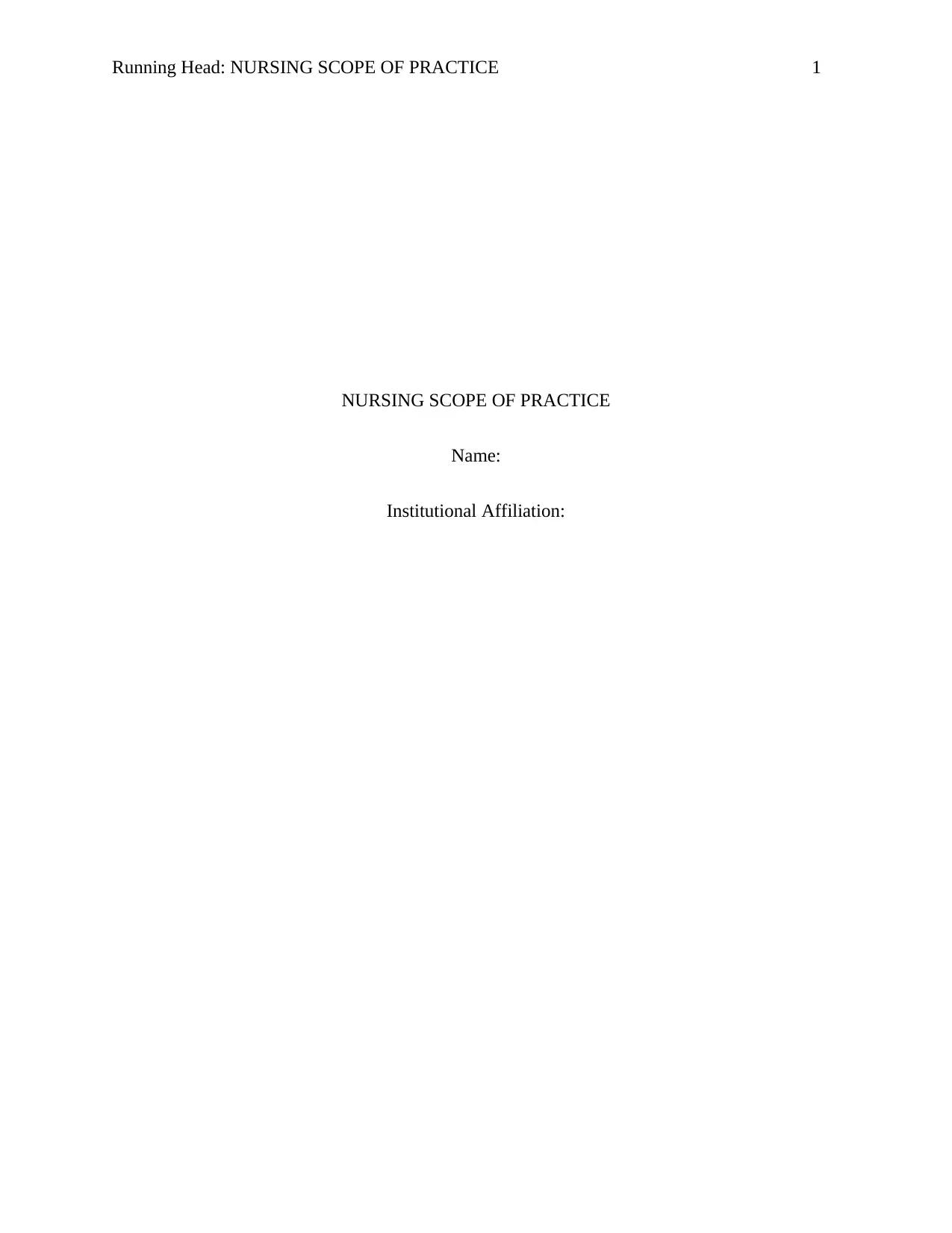
Running Head: NURSING SCOPE OF PRACTICE 1
NURSING SCOPE OF PRACTICE
Name:
Institutional Affiliation:
NURSING SCOPE OF PRACTICE
Name:
Institutional Affiliation:
Paraphrase This Document
Need a fresh take? Get an instant paraphrase of this document with our AI Paraphraser
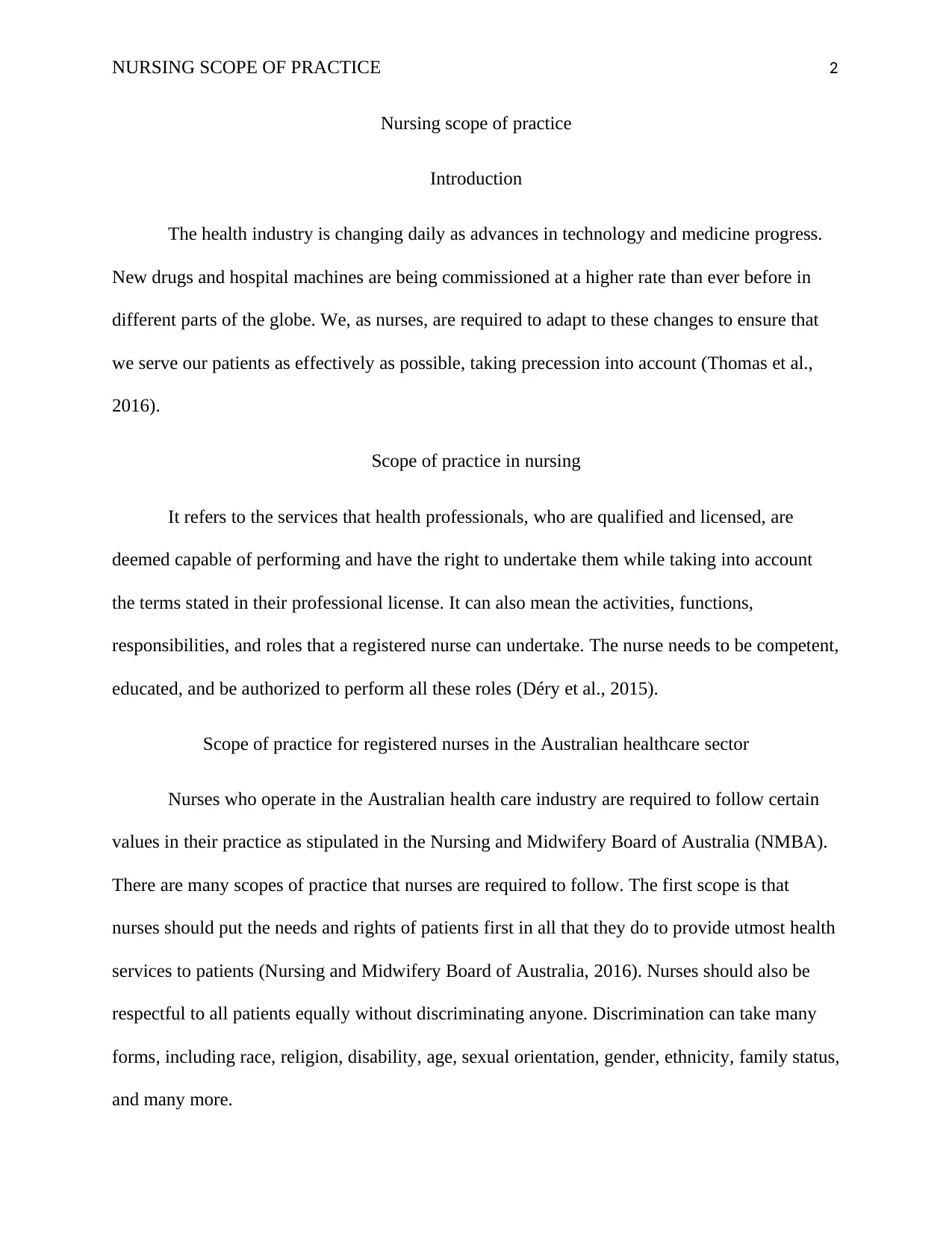
NURSING SCOPE OF PRACTICE 2
Nursing scope of practice
Introduction
The health industry is changing daily as advances in technology and medicine progress.
New drugs and hospital machines are being commissioned at a higher rate than ever before in
different parts of the globe. We, as nurses, are required to adapt to these changes to ensure that
we serve our patients as effectively as possible, taking precession into account (Thomas et al.,
2016).
Scope of practice in nursing
It refers to the services that health professionals, who are qualified and licensed, are
deemed capable of performing and have the right to undertake them while taking into account
the terms stated in their professional license. It can also mean the activities, functions,
responsibilities, and roles that a registered nurse can undertake. The nurse needs to be competent,
educated, and be authorized to perform all these roles (Déry et al., 2015).
Scope of practice for registered nurses in the Australian healthcare sector
Nurses who operate in the Australian health care industry are required to follow certain
values in their practice as stipulated in the Nursing and Midwifery Board of Australia (NMBA).
There are many scopes of practice that nurses are required to follow. The first scope is that
nurses should put the needs and rights of patients first in all that they do to provide utmost health
services to patients (Nursing and Midwifery Board of Australia, 2016). Nurses should also be
respectful to all patients equally without discriminating anyone. Discrimination can take many
forms, including race, religion, disability, age, sexual orientation, gender, ethnicity, family status,
and many more.
Nursing scope of practice
Introduction
The health industry is changing daily as advances in technology and medicine progress.
New drugs and hospital machines are being commissioned at a higher rate than ever before in
different parts of the globe. We, as nurses, are required to adapt to these changes to ensure that
we serve our patients as effectively as possible, taking precession into account (Thomas et al.,
2016).
Scope of practice in nursing
It refers to the services that health professionals, who are qualified and licensed, are
deemed capable of performing and have the right to undertake them while taking into account
the terms stated in their professional license. It can also mean the activities, functions,
responsibilities, and roles that a registered nurse can undertake. The nurse needs to be competent,
educated, and be authorized to perform all these roles (Déry et al., 2015).
Scope of practice for registered nurses in the Australian healthcare sector
Nurses who operate in the Australian health care industry are required to follow certain
values in their practice as stipulated in the Nursing and Midwifery Board of Australia (NMBA).
There are many scopes of practice that nurses are required to follow. The first scope is that
nurses should put the needs and rights of patients first in all that they do to provide utmost health
services to patients (Nursing and Midwifery Board of Australia, 2016). Nurses should also be
respectful to all patients equally without discriminating anyone. Discrimination can take many
forms, including race, religion, disability, age, sexual orientation, gender, ethnicity, family status,
and many more.
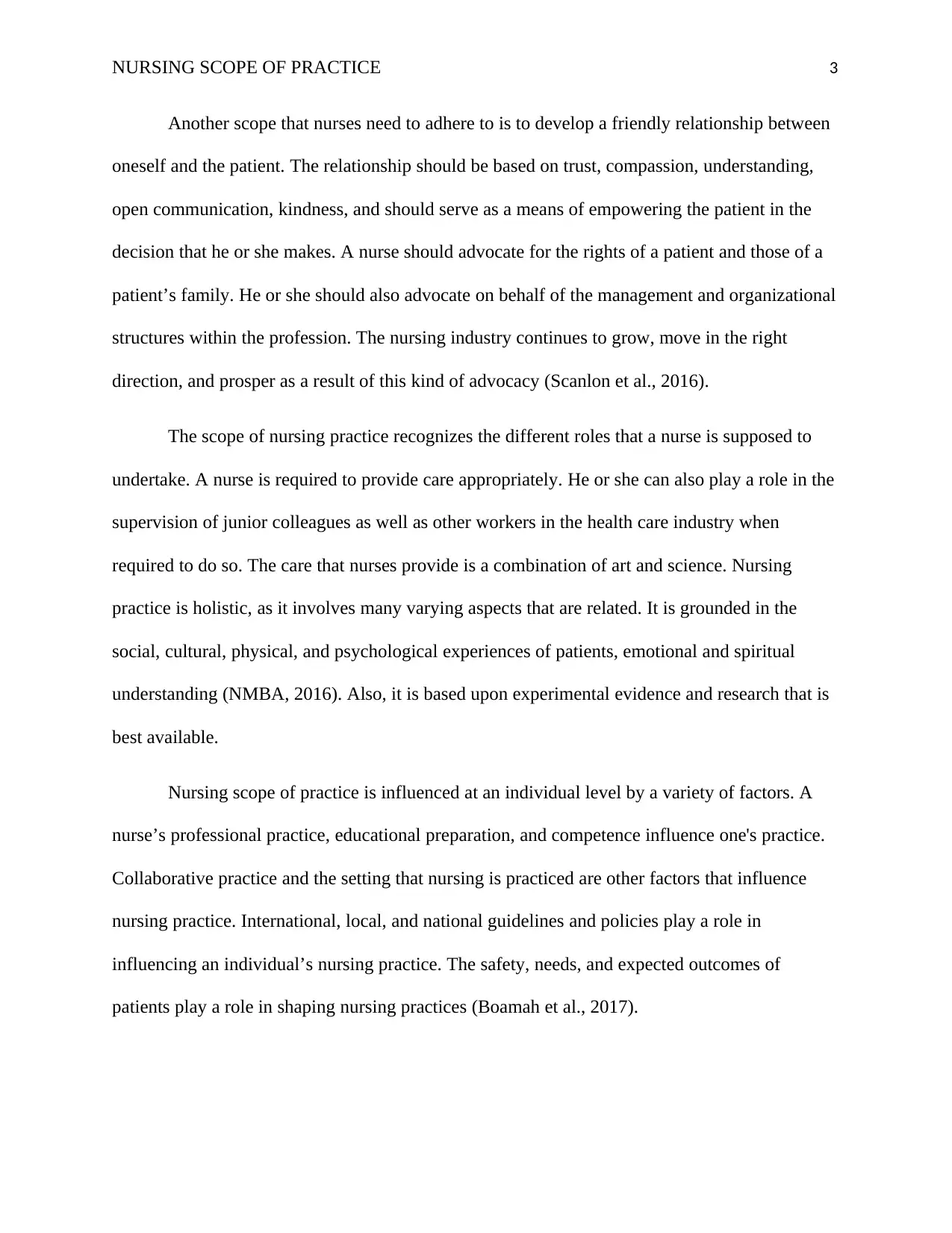
NURSING SCOPE OF PRACTICE 3
Another scope that nurses need to adhere to is to develop a friendly relationship between
oneself and the patient. The relationship should be based on trust, compassion, understanding,
open communication, kindness, and should serve as a means of empowering the patient in the
decision that he or she makes. A nurse should advocate for the rights of a patient and those of a
patient’s family. He or she should also advocate on behalf of the management and organizational
structures within the profession. The nursing industry continues to grow, move in the right
direction, and prosper as a result of this kind of advocacy (Scanlon et al., 2016).
The scope of nursing practice recognizes the different roles that a nurse is supposed to
undertake. A nurse is required to provide care appropriately. He or she can also play a role in the
supervision of junior colleagues as well as other workers in the health care industry when
required to do so. The care that nurses provide is a combination of art and science. Nursing
practice is holistic, as it involves many varying aspects that are related. It is grounded in the
social, cultural, physical, and psychological experiences of patients, emotional and spiritual
understanding (NMBA, 2016). Also, it is based upon experimental evidence and research that is
best available.
Nursing scope of practice is influenced at an individual level by a variety of factors. A
nurse’s professional practice, educational preparation, and competence influence one's practice.
Collaborative practice and the setting that nursing is practiced are other factors that influence
nursing practice. International, local, and national guidelines and policies play a role in
influencing an individual’s nursing practice. The safety, needs, and expected outcomes of
patients play a role in shaping nursing practices (Boamah et al., 2017).
Another scope that nurses need to adhere to is to develop a friendly relationship between
oneself and the patient. The relationship should be based on trust, compassion, understanding,
open communication, kindness, and should serve as a means of empowering the patient in the
decision that he or she makes. A nurse should advocate for the rights of a patient and those of a
patient’s family. He or she should also advocate on behalf of the management and organizational
structures within the profession. The nursing industry continues to grow, move in the right
direction, and prosper as a result of this kind of advocacy (Scanlon et al., 2016).
The scope of nursing practice recognizes the different roles that a nurse is supposed to
undertake. A nurse is required to provide care appropriately. He or she can also play a role in the
supervision of junior colleagues as well as other workers in the health care industry when
required to do so. The care that nurses provide is a combination of art and science. Nursing
practice is holistic, as it involves many varying aspects that are related. It is grounded in the
social, cultural, physical, and psychological experiences of patients, emotional and spiritual
understanding (NMBA, 2016). Also, it is based upon experimental evidence and research that is
best available.
Nursing scope of practice is influenced at an individual level by a variety of factors. A
nurse’s professional practice, educational preparation, and competence influence one's practice.
Collaborative practice and the setting that nursing is practiced are other factors that influence
nursing practice. International, local, and national guidelines and policies play a role in
influencing an individual’s nursing practice. The safety, needs, and expected outcomes of
patients play a role in shaping nursing practices (Boamah et al., 2017).
⊘ This is a preview!⊘
Do you want full access?
Subscribe today to unlock all pages.

Trusted by 1+ million students worldwide
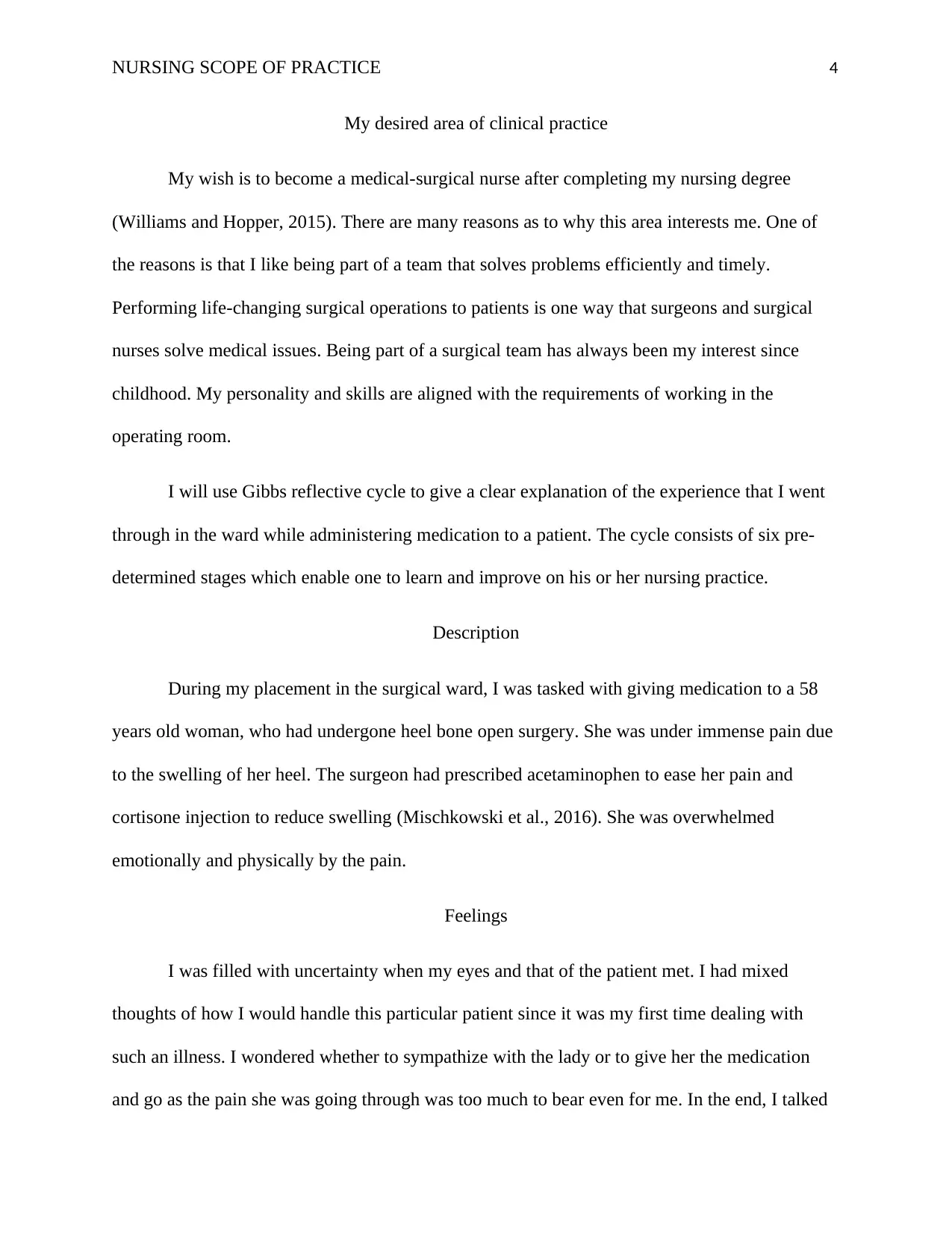
NURSING SCOPE OF PRACTICE 4
My desired area of clinical practice
My wish is to become a medical-surgical nurse after completing my nursing degree
(Williams and Hopper, 2015). There are many reasons as to why this area interests me. One of
the reasons is that I like being part of a team that solves problems efficiently and timely.
Performing life-changing surgical operations to patients is one way that surgeons and surgical
nurses solve medical issues. Being part of a surgical team has always been my interest since
childhood. My personality and skills are aligned with the requirements of working in the
operating room.
I will use Gibbs reflective cycle to give a clear explanation of the experience that I went
through in the ward while administering medication to a patient. The cycle consists of six pre-
determined stages which enable one to learn and improve on his or her nursing practice.
Description
During my placement in the surgical ward, I was tasked with giving medication to a 58
years old woman, who had undergone heel bone open surgery. She was under immense pain due
to the swelling of her heel. The surgeon had prescribed acetaminophen to ease her pain and
cortisone injection to reduce swelling (Mischkowski et al., 2016). She was overwhelmed
emotionally and physically by the pain.
Feelings
I was filled with uncertainty when my eyes and that of the patient met. I had mixed
thoughts of how I would handle this particular patient since it was my first time dealing with
such an illness. I wondered whether to sympathize with the lady or to give her the medication
and go as the pain she was going through was too much to bear even for me. In the end, I talked
My desired area of clinical practice
My wish is to become a medical-surgical nurse after completing my nursing degree
(Williams and Hopper, 2015). There are many reasons as to why this area interests me. One of
the reasons is that I like being part of a team that solves problems efficiently and timely.
Performing life-changing surgical operations to patients is one way that surgeons and surgical
nurses solve medical issues. Being part of a surgical team has always been my interest since
childhood. My personality and skills are aligned with the requirements of working in the
operating room.
I will use Gibbs reflective cycle to give a clear explanation of the experience that I went
through in the ward while administering medication to a patient. The cycle consists of six pre-
determined stages which enable one to learn and improve on his or her nursing practice.
Description
During my placement in the surgical ward, I was tasked with giving medication to a 58
years old woman, who had undergone heel bone open surgery. She was under immense pain due
to the swelling of her heel. The surgeon had prescribed acetaminophen to ease her pain and
cortisone injection to reduce swelling (Mischkowski et al., 2016). She was overwhelmed
emotionally and physically by the pain.
Feelings
I was filled with uncertainty when my eyes and that of the patient met. I had mixed
thoughts of how I would handle this particular patient since it was my first time dealing with
such an illness. I wondered whether to sympathize with the lady or to give her the medication
and go as the pain she was going through was too much to bear even for me. In the end, I talked
Paraphrase This Document
Need a fresh take? Get an instant paraphrase of this document with our AI Paraphraser
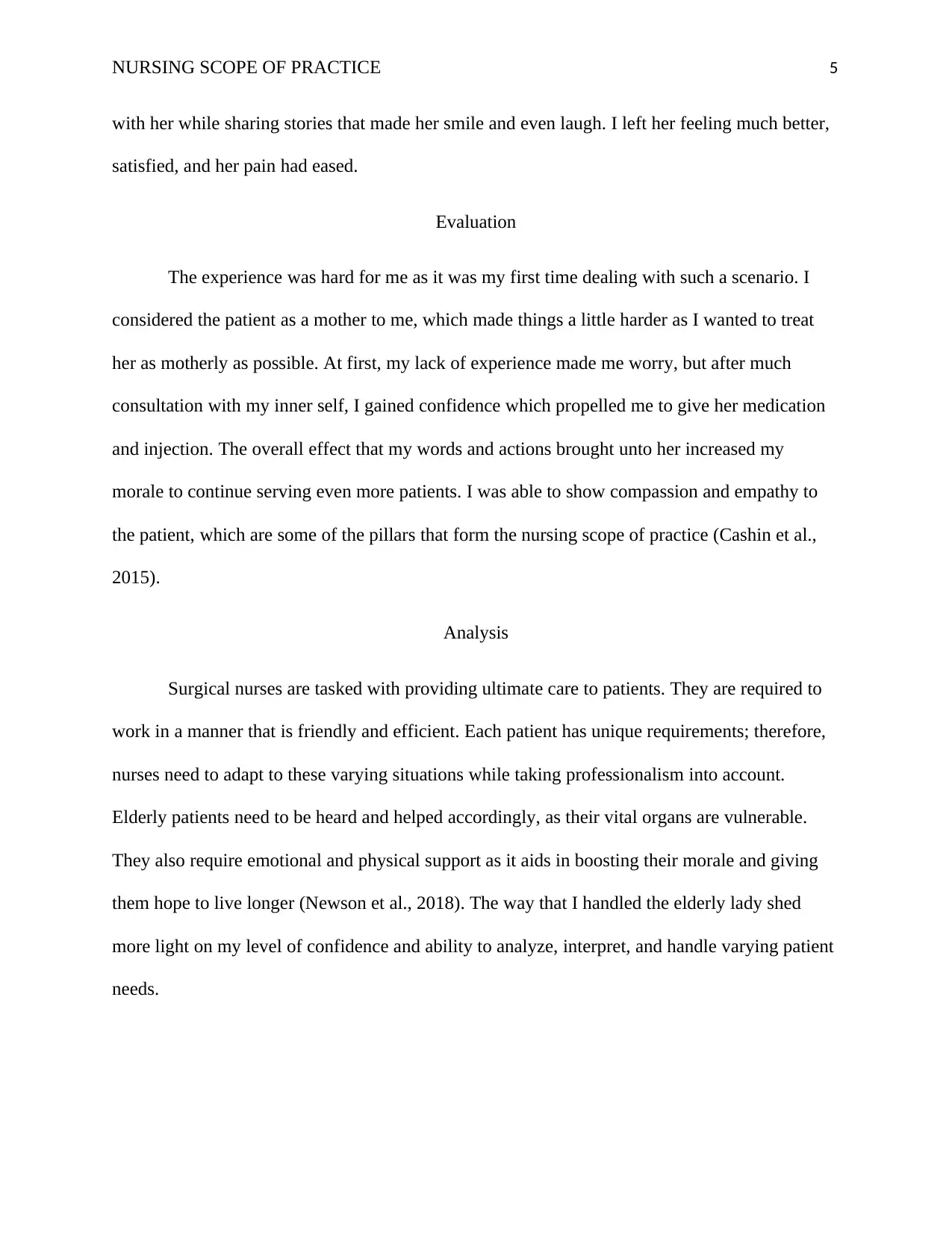
NURSING SCOPE OF PRACTICE 5
with her while sharing stories that made her smile and even laugh. I left her feeling much better,
satisfied, and her pain had eased.
Evaluation
The experience was hard for me as it was my first time dealing with such a scenario. I
considered the patient as a mother to me, which made things a little harder as I wanted to treat
her as motherly as possible. At first, my lack of experience made me worry, but after much
consultation with my inner self, I gained confidence which propelled me to give her medication
and injection. The overall effect that my words and actions brought unto her increased my
morale to continue serving even more patients. I was able to show compassion and empathy to
the patient, which are some of the pillars that form the nursing scope of practice (Cashin et al.,
2015).
Analysis
Surgical nurses are tasked with providing ultimate care to patients. They are required to
work in a manner that is friendly and efficient. Each patient has unique requirements; therefore,
nurses need to adapt to these varying situations while taking professionalism into account.
Elderly patients need to be heard and helped accordingly, as their vital organs are vulnerable.
They also require emotional and physical support as it aids in boosting their morale and giving
them hope to live longer (Newson et al., 2018). The way that I handled the elderly lady shed
more light on my level of confidence and ability to analyze, interpret, and handle varying patient
needs.
with her while sharing stories that made her smile and even laugh. I left her feeling much better,
satisfied, and her pain had eased.
Evaluation
The experience was hard for me as it was my first time dealing with such a scenario. I
considered the patient as a mother to me, which made things a little harder as I wanted to treat
her as motherly as possible. At first, my lack of experience made me worry, but after much
consultation with my inner self, I gained confidence which propelled me to give her medication
and injection. The overall effect that my words and actions brought unto her increased my
morale to continue serving even more patients. I was able to show compassion and empathy to
the patient, which are some of the pillars that form the nursing scope of practice (Cashin et al.,
2015).
Analysis
Surgical nurses are tasked with providing ultimate care to patients. They are required to
work in a manner that is friendly and efficient. Each patient has unique requirements; therefore,
nurses need to adapt to these varying situations while taking professionalism into account.
Elderly patients need to be heard and helped accordingly, as their vital organs are vulnerable.
They also require emotional and physical support as it aids in boosting their morale and giving
them hope to live longer (Newson et al., 2018). The way that I handled the elderly lady shed
more light on my level of confidence and ability to analyze, interpret, and handle varying patient
needs.
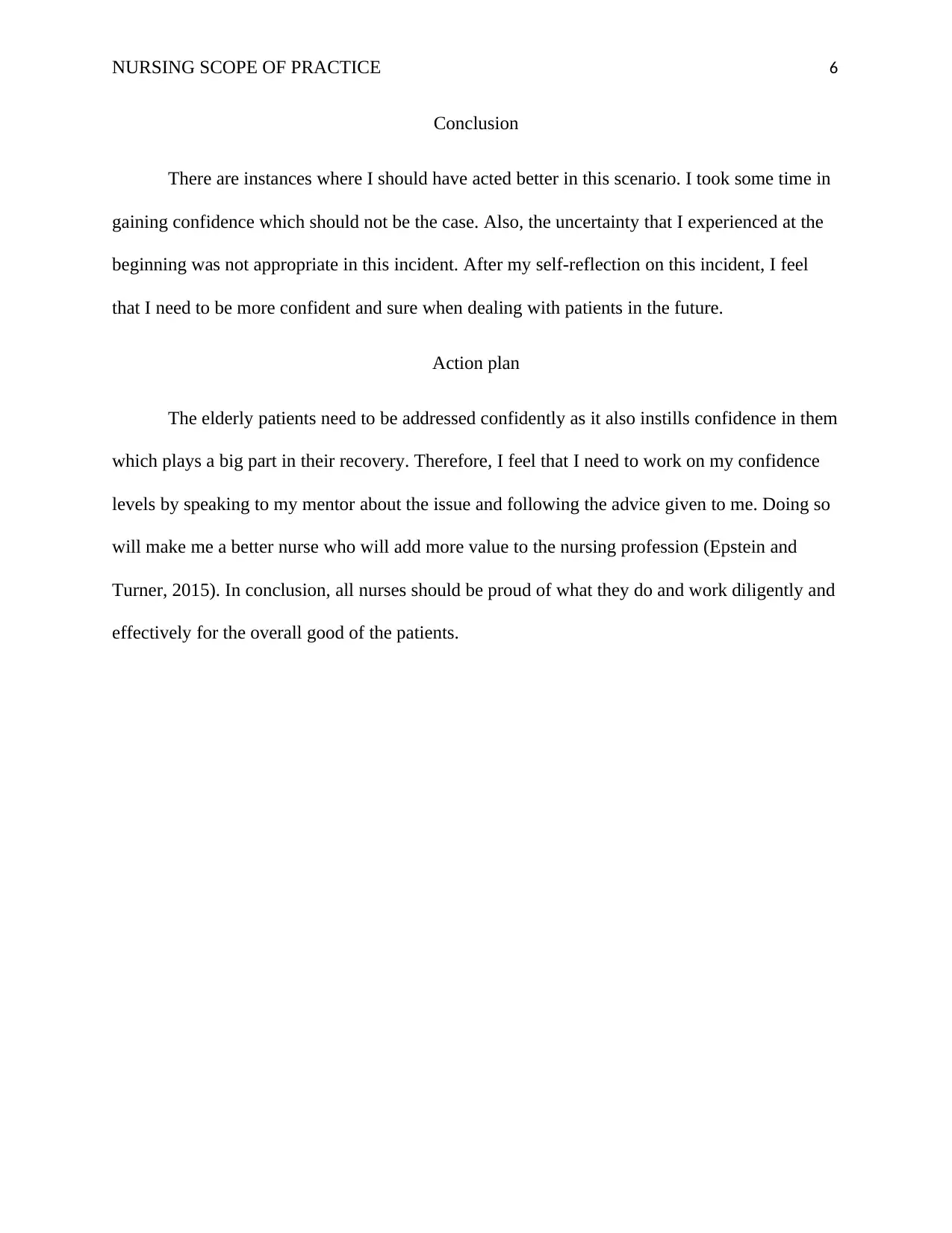
NURSING SCOPE OF PRACTICE 6
Conclusion
There are instances where I should have acted better in this scenario. I took some time in
gaining confidence which should not be the case. Also, the uncertainty that I experienced at the
beginning was not appropriate in this incident. After my self-reflection on this incident, I feel
that I need to be more confident and sure when dealing with patients in the future.
Action plan
The elderly patients need to be addressed confidently as it also instills confidence in them
which plays a big part in their recovery. Therefore, I feel that I need to work on my confidence
levels by speaking to my mentor about the issue and following the advice given to me. Doing so
will make me a better nurse who will add more value to the nursing profession (Epstein and
Turner, 2015). In conclusion, all nurses should be proud of what they do and work diligently and
effectively for the overall good of the patients.
Conclusion
There are instances where I should have acted better in this scenario. I took some time in
gaining confidence which should not be the case. Also, the uncertainty that I experienced at the
beginning was not appropriate in this incident. After my self-reflection on this incident, I feel
that I need to be more confident and sure when dealing with patients in the future.
Action plan
The elderly patients need to be addressed confidently as it also instills confidence in them
which plays a big part in their recovery. Therefore, I feel that I need to work on my confidence
levels by speaking to my mentor about the issue and following the advice given to me. Doing so
will make me a better nurse who will add more value to the nursing profession (Epstein and
Turner, 2015). In conclusion, all nurses should be proud of what they do and work diligently and
effectively for the overall good of the patients.
⊘ This is a preview!⊘
Do you want full access?
Subscribe today to unlock all pages.

Trusted by 1+ million students worldwide
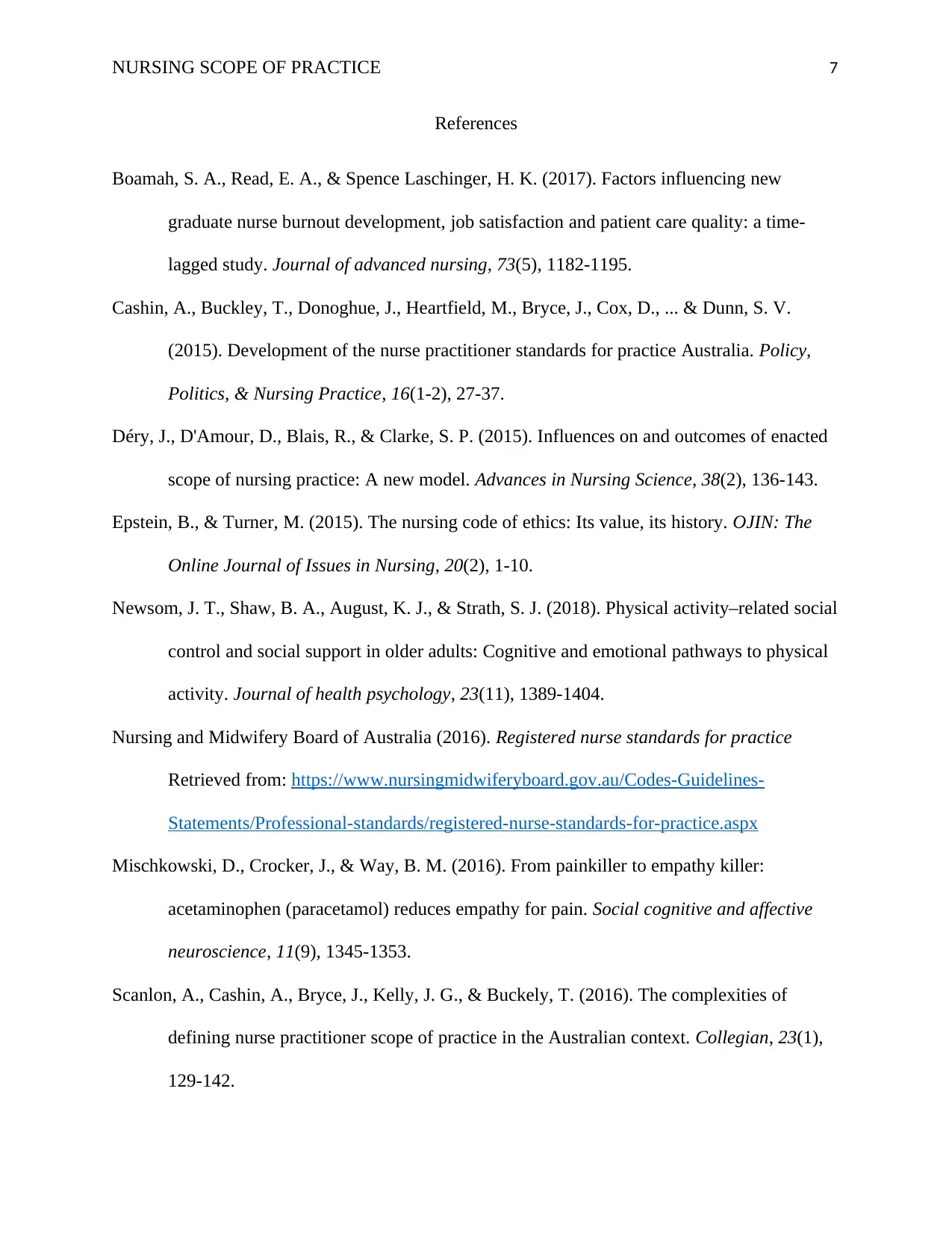
NURSING SCOPE OF PRACTICE 7
References
Boamah, S. A., Read, E. A., & Spence Laschinger, H. K. (2017). Factors influencing new
graduate nurse burnout development, job satisfaction and patient care quality: a time‐
lagged study. Journal of advanced nursing, 73(5), 1182-1195.
Cashin, A., Buckley, T., Donoghue, J., Heartfield, M., Bryce, J., Cox, D., ... & Dunn, S. V.
(2015). Development of the nurse practitioner standards for practice Australia. Policy,
Politics, & Nursing Practice, 16(1-2), 27-37.
Déry, J., D'Amour, D., Blais, R., & Clarke, S. P. (2015). Influences on and outcomes of enacted
scope of nursing practice: A new model. Advances in Nursing Science, 38(2), 136-143.
Epstein, B., & Turner, M. (2015). The nursing code of ethics: Its value, its history. OJIN: The
Online Journal of Issues in Nursing, 20(2), 1-10.
Newsom, J. T., Shaw, B. A., August, K. J., & Strath, S. J. (2018). Physical activity–related social
control and social support in older adults: Cognitive and emotional pathways to physical
activity. Journal of health psychology, 23(11), 1389-1404.
Nursing and Midwifery Board of Australia (2016). Registered nurse standards for practice
Retrieved from: https://www.nursingmidwiferyboard.gov.au/Codes-Guidelines-
Statements/Professional-standards/registered-nurse-standards-for-practice.aspx
Mischkowski, D., Crocker, J., & Way, B. M. (2016). From painkiller to empathy killer:
acetaminophen (paracetamol) reduces empathy for pain. Social cognitive and affective
neuroscience, 11(9), 1345-1353.
Scanlon, A., Cashin, A., Bryce, J., Kelly, J. G., & Buckely, T. (2016). The complexities of
defining nurse practitioner scope of practice in the Australian context. Collegian, 23(1),
129-142.
References
Boamah, S. A., Read, E. A., & Spence Laschinger, H. K. (2017). Factors influencing new
graduate nurse burnout development, job satisfaction and patient care quality: a time‐
lagged study. Journal of advanced nursing, 73(5), 1182-1195.
Cashin, A., Buckley, T., Donoghue, J., Heartfield, M., Bryce, J., Cox, D., ... & Dunn, S. V.
(2015). Development of the nurse practitioner standards for practice Australia. Policy,
Politics, & Nursing Practice, 16(1-2), 27-37.
Déry, J., D'Amour, D., Blais, R., & Clarke, S. P. (2015). Influences on and outcomes of enacted
scope of nursing practice: A new model. Advances in Nursing Science, 38(2), 136-143.
Epstein, B., & Turner, M. (2015). The nursing code of ethics: Its value, its history. OJIN: The
Online Journal of Issues in Nursing, 20(2), 1-10.
Newsom, J. T., Shaw, B. A., August, K. J., & Strath, S. J. (2018). Physical activity–related social
control and social support in older adults: Cognitive and emotional pathways to physical
activity. Journal of health psychology, 23(11), 1389-1404.
Nursing and Midwifery Board of Australia (2016). Registered nurse standards for practice
Retrieved from: https://www.nursingmidwiferyboard.gov.au/Codes-Guidelines-
Statements/Professional-standards/registered-nurse-standards-for-practice.aspx
Mischkowski, D., Crocker, J., & Way, B. M. (2016). From painkiller to empathy killer:
acetaminophen (paracetamol) reduces empathy for pain. Social cognitive and affective
neuroscience, 11(9), 1345-1353.
Scanlon, A., Cashin, A., Bryce, J., Kelly, J. G., & Buckely, T. (2016). The complexities of
defining nurse practitioner scope of practice in the Australian context. Collegian, 23(1),
129-142.
Paraphrase This Document
Need a fresh take? Get an instant paraphrase of this document with our AI Paraphraser
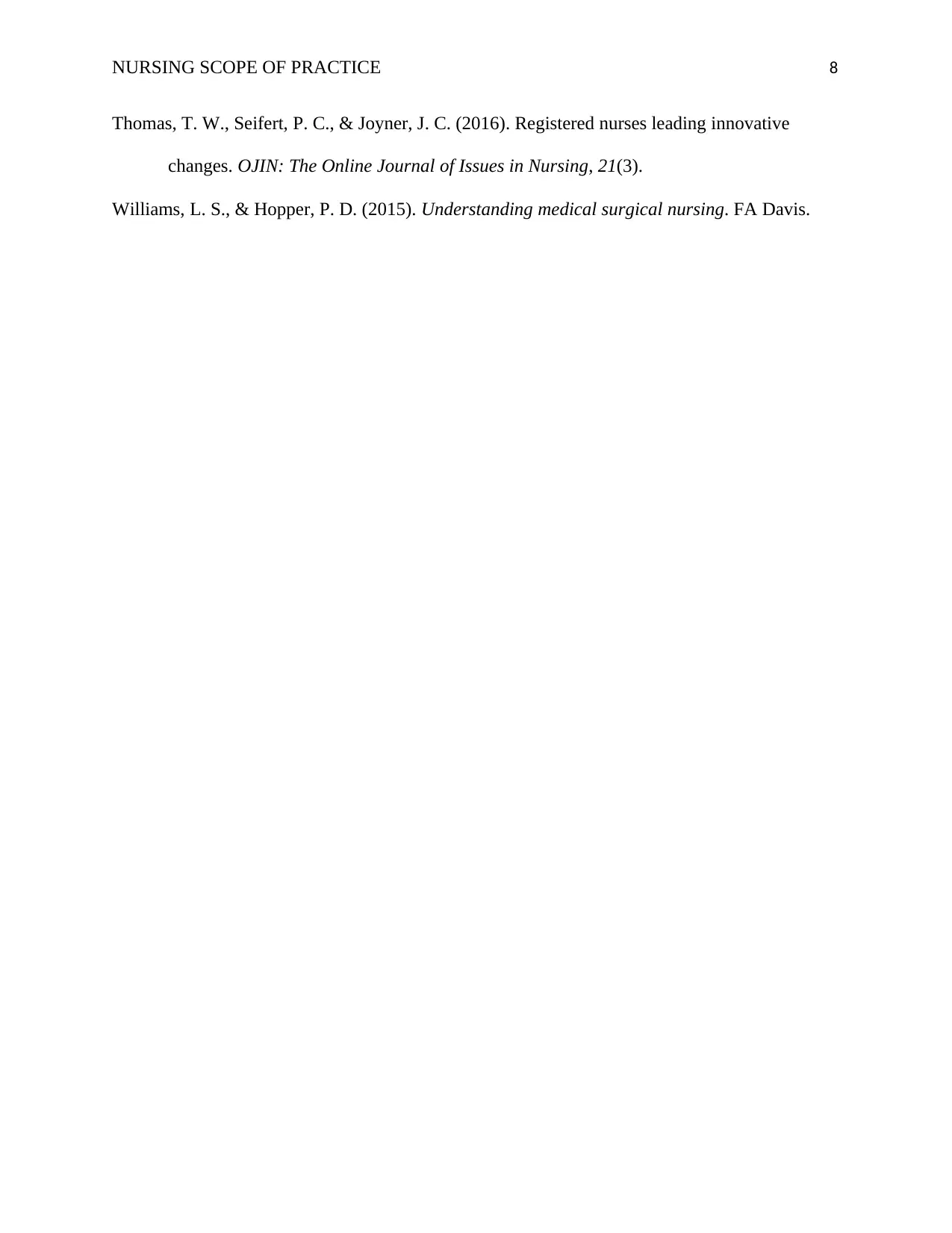
NURSING SCOPE OF PRACTICE 8
Thomas, T. W., Seifert, P. C., & Joyner, J. C. (2016). Registered nurses leading innovative
changes. OJIN: The Online Journal of Issues in Nursing, 21(3).
Williams, L. S., & Hopper, P. D. (2015). Understanding medical surgical nursing. FA Davis.
Thomas, T. W., Seifert, P. C., & Joyner, J. C. (2016). Registered nurses leading innovative
changes. OJIN: The Online Journal of Issues in Nursing, 21(3).
Williams, L. S., & Hopper, P. D. (2015). Understanding medical surgical nursing. FA Davis.
1 out of 8
Related Documents
Your All-in-One AI-Powered Toolkit for Academic Success.
+13062052269
info@desklib.com
Available 24*7 on WhatsApp / Email
![[object Object]](/_next/static/media/star-bottom.7253800d.svg)
Unlock your academic potential
Copyright © 2020–2026 A2Z Services. All Rights Reserved. Developed and managed by ZUCOL.





